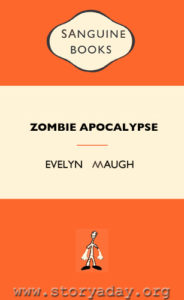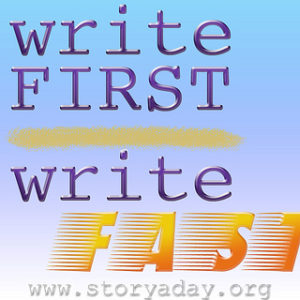 “If you want to write, practice writing. Practice it for hours a day, not to come up with a story you can publish but because you long to learn how to write well, because there is something that you alone can say. Write the story, learn from it, put it away, write another story.”
“If you want to write, practice writing. Practice it for hours a day, not to come up with a story you can publish but because you long to learn how to write well, because there is something that you alone can say. Write the story, learn from it, put it away, write another story.”
– Ann Patchett “The Getaway Car: A Practical Memoir About Writing and Life (Kindle Single) “
“
I had barely started reading Ann Patchett’s short treatise on writing, when I wanted to adopt her.
We, as writers, can spend all day reading about writing (or just reading, for that matter), but there is nothing like the act of writing to teach us how to do the job.
WRITE A LOT
And not just writing, but writing a lot. My new buddy Ann puts it perfectly:
“Think of a sink pipe filled with sticky sediment: The only way to get clean water is to force a small ocean through the tap. Most of us are full up with bad stories, boring stores, self-indulgent stories, searing works of unendurable melodrama. We must get all of them out of our system in order to find the good stories that may or may not exist in the fresh water underneath.”
What?! There’s no reason to apologize or feel bad about all the trite, self-indulgent stories that bubble up to the surface? There is no reason to expect that any of what we write will be good, especially if it has been a while since we did any serious writing-in-quantity? We can write without being perfect? What a concept!
TEN THOUSAND HOURS
And it’s not just m’buddy Ann.
Malcolm Gladwell points out, in his fascinating book Outliers: The Story of Success , that experts become experts not by being talented or smart, but by loving what they do and putting in lots and lots of practice. He refers to a study into musical talent and preparation by psychologist K. Anders Ericsson:
, that experts become experts not by being talented or smart, but by loving what they do and putting in lots and lots of practice. He refers to a study into musical talent and preparation by psychologist K. Anders Ericsson:
“Ericsson and his colleagues then compared amateur pianists with professional pianists…The amateurs never practiced more than three hours a week over the course of their childhood, and by the age of twenty they had totaled two thousand hours of practice. The professionals, on the other hand, steadily increased their practice time every year, until by the age of twenty they, like the violinists, had reached ten thousand hours. The striking thing about Ericsson’s study is that he and his colleagues couldn’t find any ‘natural’, musicians who floated effortlessly to the top while practicing a fraction of the time their peers did.”
(And you thought a story a day sounded like a big commitment!)
Gladwell applies this theory to all kinds of experts and ‘geniuses’ including Steve Jobs, Bill Gates and The Beatles.
“And what’s more, the people at the very top don’t work just harder or even much harder than everyeone else. They work much, much harder.”
THE JOY OF WORK
But don’t let that word “work” scare you. After all, you are a writer. You love to write (or at the very least, you love having written!).
The reason the Bills, Steves, John-Paul-George-and-Ringoes and Yo-Yo Mas of the world “work” so hard to become world-class at what they do, is precisely because they don’t see it as “work”. They love what they do.
Not every second, I would imagine — any more than you love those moments when you want to bang your head off the desk then throw your computer out of the window. But we love what we do, in the sense that we will do it forever, for the joy of it, whether or not anyone ever pays us for it.
LEARNING TO DO IT WELL
So we might as well do it well.
The consensus seems to be that to do something well, you have to do lots of it. You have to practice. And you have to learn to love the practice, not just the promise of future rewards. Steve Jobs famously celebrated his meandering approach to education, saying that if he had never stumbled into a typography class (and loved it), the Mac would never have become what it did – and nor would Apple, and nor would Steve Jobs.
StoryADay is here to help you get back into the habit of practicing your writing. It’s not here to promise you publication, or fame or riches. It’s not here to promise you’ll write anything throughout the whole month that will be worthy of publishing. But StoryADay May is coming to help you push yourself to practice. Think of StADa as the parent who made you play scales between piano lessons; the coach who inspired you throw endless pitches at the side of your house in the evenings; the teacher who made you do fractions over and over and over again until it finally clicked and you started to see the music between the numbers.
Use StoryADay in place of the teacher Ann Patchett still celebrates for teaching her,
“..how to love the practice and how to write in a quantity that would allow me to figure out for myself what I was actually good at. I got better at closing the gap between my hand and my head by clocking in the hours, stacking up the pages.”
Are you ready to start stacking up the pages?
 One of the nine plot patterns highlighted in James Scott Bell’s Plot & Structure
One of the nine plot patterns highlighted in James Scott Bell’s Plot & Structure is:









![[Write On Wednesday] – Leap](https://storyaday.org/wp-content/uploads/2012/04/leap.jpg)


![[Interview] – Writing A Story A Day with Vanessa Matthews](https://storyaday.org/wp-content/uploads/2012/04/VanessaMatthews1.jpg)

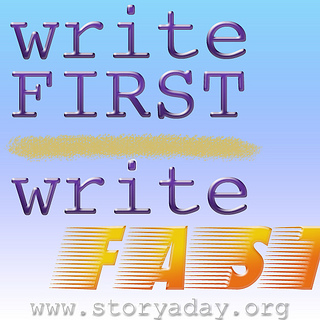

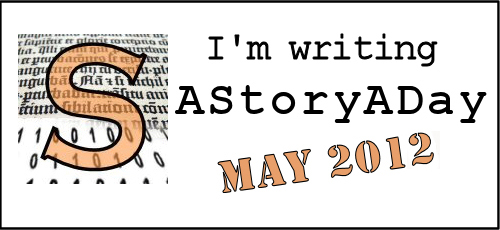


![[Write On Wednesday] Location As Character](https://storyaday.org/wp-content/uploads/2012/04/Screen-shot-2012-04-18-at-10.57.55-AM-1200x511.png)

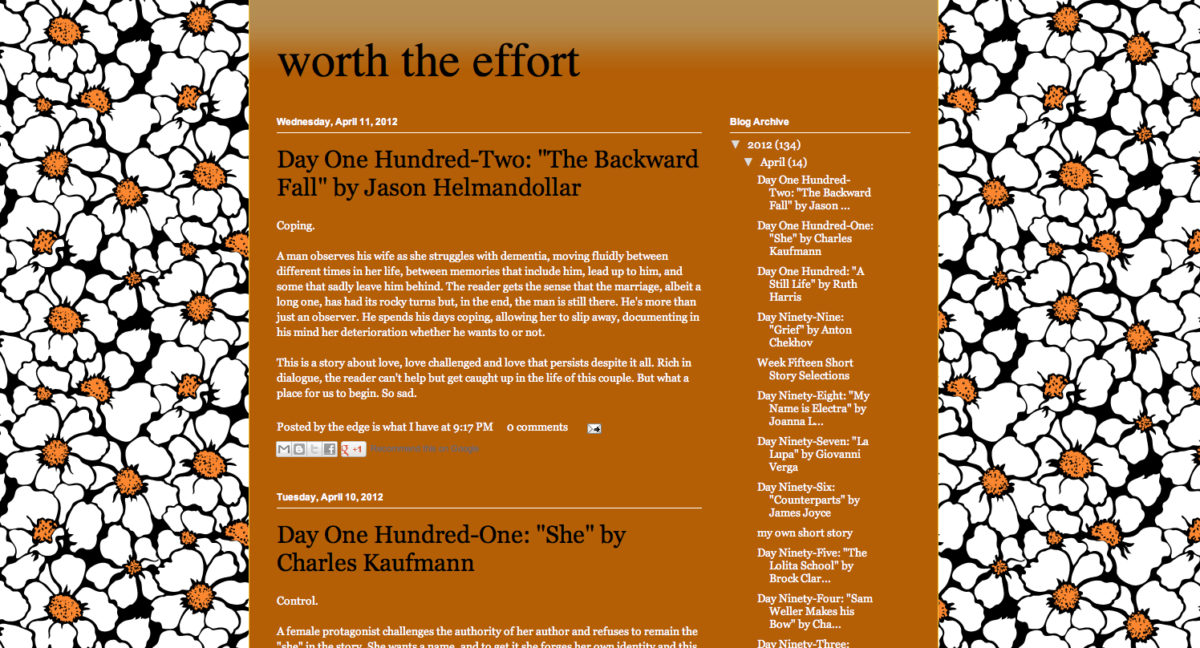
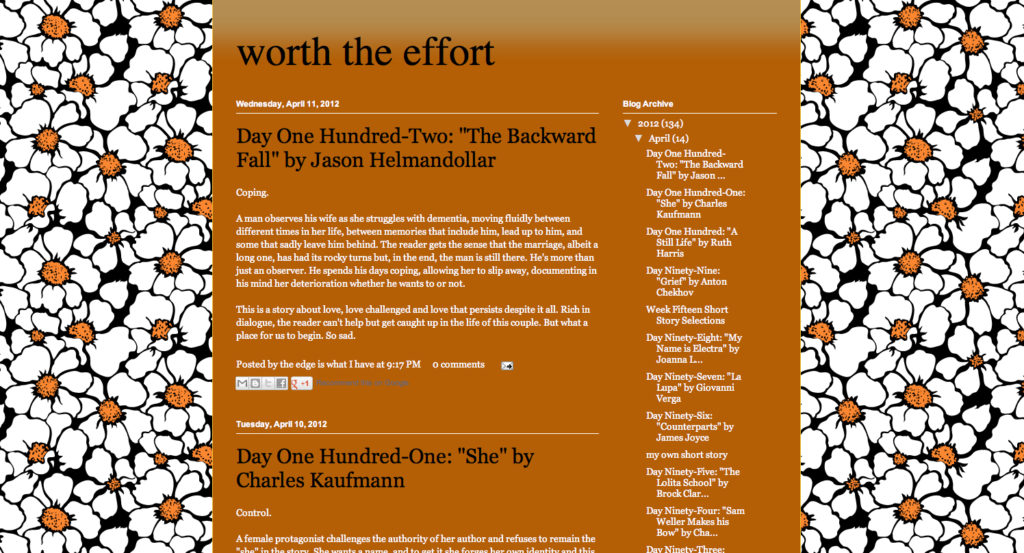
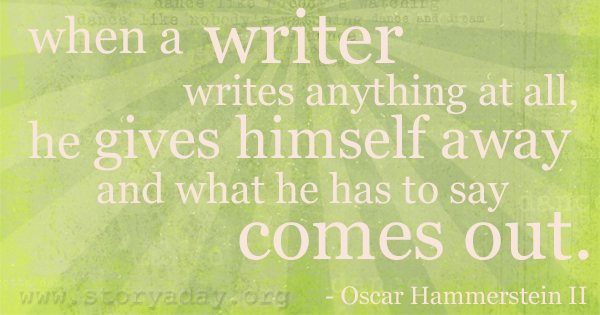
![[Write On Wednesday] – Style Switch](https://storyaday.org/wp-content/uploads/2012/04/Sanguine-book-parody_11.jpg)
